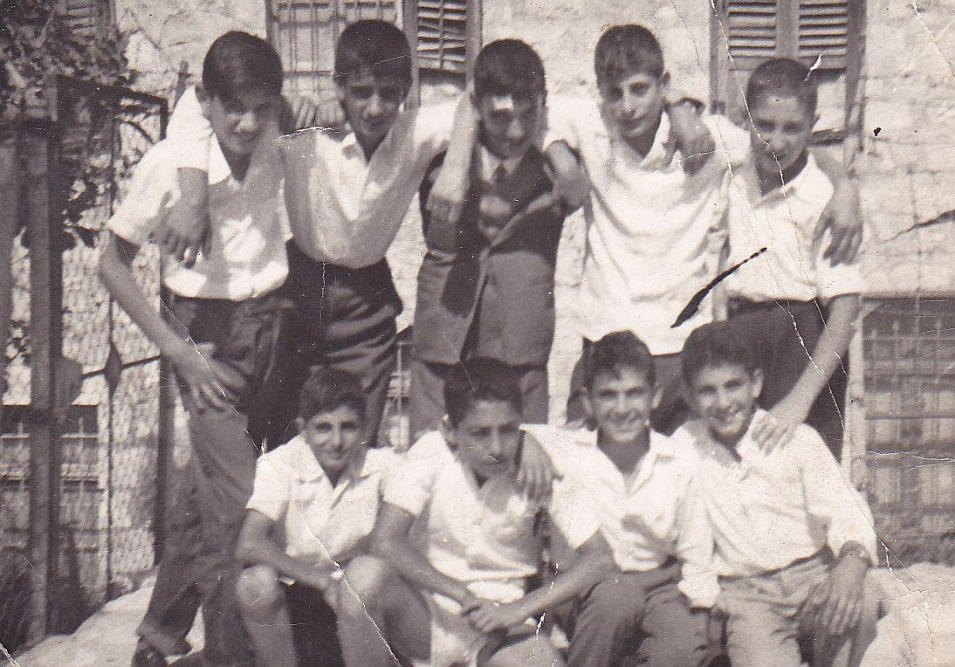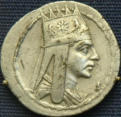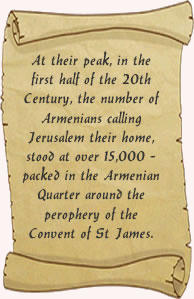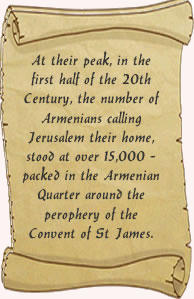

Armenian Jerusalem



a pride of kaghakatsi boys

The ancestors of the kaghakatsi Armenians who settled in Jerusalem,
selecting the southwest corner of its Old City for their domicile,
adapted with ease and harmony to the new way of life. From distant
homes in a mountainous homeland, they brought with them a rich and
varied cornucopia they bequeathed to the "bantoukhd" (an expatriate
but also implying someone who has been forced to leave home and is
yearning to return) generations that came after them.
That was the legacy my mother and grandmother left me. It has always been in the bosom of the women that our culture and heritage have most securely been preserved. Alas, most of that exquisite legacy is lost to us - perhaps, some ancient records cataloguing these do linger in some obscure library, waiting to be discovered and explored. Perhaps, they are gone forever. Or are waiting for a Howard Carter to chance upon them and uncover them. Inevitably, the Armenians adopted many of the local customs and traditions, in their turn, enriching the prevalent culture, whether it was Turkish, Arab or Jewish, with their own unique imprint. But Arabic has, de jure, exerted a predominant infulence on the Armenians (as well as the other non-Muslim communitities of Jerusalem), most notably during the British Mandate and later the Jordanian administration of the city. Because of a native propensity for and alacrity for languages, Armenians were quick to learn Arabic (as they would later Hebrew) and adapt to the new culture, huge segments of which they incorporated into their own traditions. Armenians not only adopted they also adapted their new acquisitions. The kaghakatsi couched the Arabic they spoke in a coccoon of its own, sprinkling in a varied mixture of Armenian or Turkish words to give it more individualistic spice. Is it any wonder then that some of the Arabic phrases they coined were almost incomprehensible to the Arab man in the street? Among the picturesque and intriguing new modes of expression that appealed to them most was the facile tendency of the Arab to punctuate his expositions with the great variety of "amthal" (proverbs or sayings) that his people had at their disposal, some of them inherited from the Jahiliya (pre-Islamic) era. This ancient lore contained gems of wisdom treasured by our forefathers because they illuminated and inspired their actions, thought and speech. Some of these gems were handed down the generations and became part of the kaghakatsi culture. And as the kaghakatsi integrated into the indigenous fabric of the city, the local coloring rubbed on. The Armenian the kaghakatsis spoke soon fell prey to native language interference, and in recent times, Arabic literally became the lingua franca of the Armenian Quarter of Jerusalem. Arabic, an extremely rich language noted for its mellifluous felicity and affinity to poetry, infiltrated into all aspects of everyday life, including everyday vernacular, with prayers and proverbs the most vulnerable. These gems provide an intimate peek into the epitome of the kaghakatsi way of thinking and acting, his aspirations and dreams, and his humor. The jokes remain coarse and the sayings have a tedious tendency to hover around the lower extremities - an unhelpful person is so disgustful, he/she would not even be willing to "piss on a wounded finger" (and alleviate someone's pain, or give someone a hand). Particular rancor is reserved for the conceited who is likened to an early morning bowel deposit that, because it is the day's first emanation and therefore fresh, squats arrogantly in the bowl. The miser gets his comeuppance too: "He inserts his finger in his anus, and smells it. . . " as if to make sure that he has not lost, missed or dropped anything valuable (and thus become poorer) (by mistake). Should he feel the need to break wind, foremost in his mind would be the thought, "the heck with it, I'd rather the fart betrayed me and embarrassed me rather than burst me." And if a person is surly and grouchy, then his face would not smile even at the sight of a freshly baked ragheef , the wafer thin pita that is the staple bread in the Middle East. The useless or purposeless comings and goings of a person are likened to the swinging testicles of a person sifting sand. But the Arab, whose poetry is a musical embodiment of the whole range of human sentiment, both sacred and profane, also concedes that life can be both precious and meaningless. " Yom 'assal, yom bassal, " one day you may dine on honey, the next on onions, a reflection on the vagaries of life. But he would prefer life to death: "' isheh qadar wa la nomeh taHt al Hajar, " (let me have life, even though sordid, sooner than sleep under a headstone). And Abul Nawwas, that notorious poet of profanity, goes so far as to say, "If I live, fine, if I don't live, ' la teezy, '" loosely, "I would smack my posterior," a common gesture of insouciance or defiance among Arabs. The Old City Jerusalemite is a pragmatist of sorts. If there are any taps to fix in your home, or a broken window to repair, you're better off calling a plumber or a glazier, because you are definitely going to make a mess of it. "You are better off giving your dough to the baker ( farran) to bake, even if he eats half of it," because that is his trade and he knows what he is doing. The reference is to an unwritten law that stipulates that any dough or pastry taken to a bakery will attract a "tithe." Or, " illi mish karo, ya naro ", if plumbing or carpentry is not your trade, then you bungle (burn) the job. Little has changed over the years in the character of the Old City's Armenian denizens. The domination of neither Ottoman, nor British, Arab, or Jewish overlords has had any perceptible effect on him. Fiercely independent, the Armenian of Jerusalem remains a social, friendly, hospitable and generous soul, a little given to exaggeration no doubt, but one who knows how to share. Before you move into a house, you are advised to check out your neighbors first because they will be closer to you than your own brother. They are the ones you turn to when you are in trouble. They are the ones you break bread and drink coffee with. In Middle Eastern tradition, a good neighbor is worth his/her weight in gold. Is it any wonder then that the people of the Middle East take the Prophet's injunction, "look after your neighbor, even unto the seventh one" to heart? This is the culture that begat Hatem al Tai, the legendary Arab chieftain who felt no compunctions about sacrificing his finest steed to feed a guest when he ran out of other offerings. When you break bread with an Arab, you become a valued guest and no harm should befall you whenever you are under his roof. Another famous saying, this one from Egypt, carves this out in stone: "We have eaten break and salt together." That cements our friendship. Blessings, proverbs and poetry illuminate the soul of the Armenian of Jerusalemite. Add to that filial piety. Perhaps, modern mores, spurred by insipid examples from the West, have infected current generations with the dubious virtues of permissiveness, but there was a time not long ago, when no son or daughter would cross a threshold without kissing the hand of the elders inside. The gesture would automatically prompt a suitable blessing. My grandfather's favorite was: "May the earth you touch be transmuted into gold." My mother would remind me, " Rida al abb min al rabb ," a father's blessing is akin to the blessing bestowed upon you by the Lord. As is common in Arabic, a word will have more meanings embedded in it than its counterpart in any other language - and "rida" would also imply acceptance, gratification, satisfaction for acceptable or expected conduct. Carob juice vendor The Arabic language is perhaps one of the world's most picturesque. And musical. The vocabulary is intensely rich and variegated. For instance, there are close to 50 definitions for a lion, tracing its birth, growth, physical attributes, sex, habits, and so on. And when an Arab wants to utter a proverb, he invariably chooses one with a poetic rhyme. Thus, " yom 'assal yom bassal " and others that are a challenge to utter for a non-native speaker. Like this, " el mat'ouss mat'ouss, wa laww 'alla'ou 'ala teezoh fanoos ." Which translates as: if you are unlucky, you will remain unlucky, even if they hang a lantern on your backside. Children have always been spoiled rotten, a preoccupation prevalent among Jerusalem society. And no matter where the Jerusalem Armenian is domiciled, he/she will hold that as a prerogative. But, make no mistake, if a child crosses the line, a very wide one true, but nevertheless, quite clear, the consequences for the child can be dire. " Al banat ham lal mamat ," girls/daughters will always be a worry/problem, until the day of death (the proverb does not specify whose death, the child's or the parent's). This saying probably harks back to the practice of female infanticide during the pre-Islamic Arab dark age, Al Jahiliya, (literally, the era of ignorance). Like a desert khamseen, Islam wiped out this horrible custom of burying newly born daughters alive for fear of letting them fall captive to raiding parties. This was one of the worst Jahiliya abominations that Mohammed promptly abolished. Subsequently, Islam endowed females with privileges they had never dreamed of enjoying before. Among them, the provision of a prenuptial dowry by a prospective groom and the laying aside of a special sum at the disposal of his wife should he decide to divorce her later. But though the concept of leaving home at 18 is totally alien, "there will come a day, when your child will depart and not come back, will eat and not be sated, and you will call him/her, but he/she will not respond." Family ties are sacrosanct, because "blood will never turn to water." I and my brother will stand up to up against my cousin, but when a stranger threatens us, then I and my cousin will join forces to fight him. But then again, if a stranger marries my mother, then he becomes my uncle! And is therefore accorded due respect! The Arab's profound inner sense of pride makes it difficult for him to poke fun at himself, or enjoy being made an object of laughter. On the other hand, he likes nothing better than to poke fun at others, particularly those less fortunate. And his satire can sometimes prove devastating to the victim: pre-Islamic Arab literature is rife with such instances. In one particular case, during "Jahiliya" era, an entire tribe found it expedient to relocate elsewhere after being satirized as being as tall as mules, and dreaming dreams of birds: " tool al bighali, wa ahlam al 'asafeeri. " The Arab is a pragmatist of sorts. If there are any taps to fix in your home, or a broken window to repair, you're better off calling a plumber or a glazier, because you are definitely going to make a mess of it. " A'ti khubzak lal farran wa laww akal noussoh :" you are better off giving your dough to the baker to bake, even if he eats half of it, because that is his trade and he knows what he is doing. The reference is to an unwritten law that stipulates that any dough or pastry taken to a bakery will attract a "tithe." Here, in this compilation of wisdom sayings, is an intimate peek into the epitome of the Kaghakatzi way of thinking and acting, his aspirations and dreams, and his humor. We have opted not to reproduce them in Classical Arabic for the simple reason that these utterings are in the local Jerusalem Arabic vernacular and that is a far cry from the formal language. Little has changed in the character of the host Arab whose musings have impacted so heavily on Kaghakatzi culture. Some of his mores disappeared in the sweeping wake of the reforming new monotheistic religion, Islam, but the core has remained unchanged. The Arab remains a social, friendly, hospitable and generous soul, a little given to exaggeration no doubt, but one who knows how to share. Among this ancient lore are the gems of wisdom our forefathers treasured. Sayings and proverbs they lived by and that illuminated and inspired their actions, thought and speech.

























